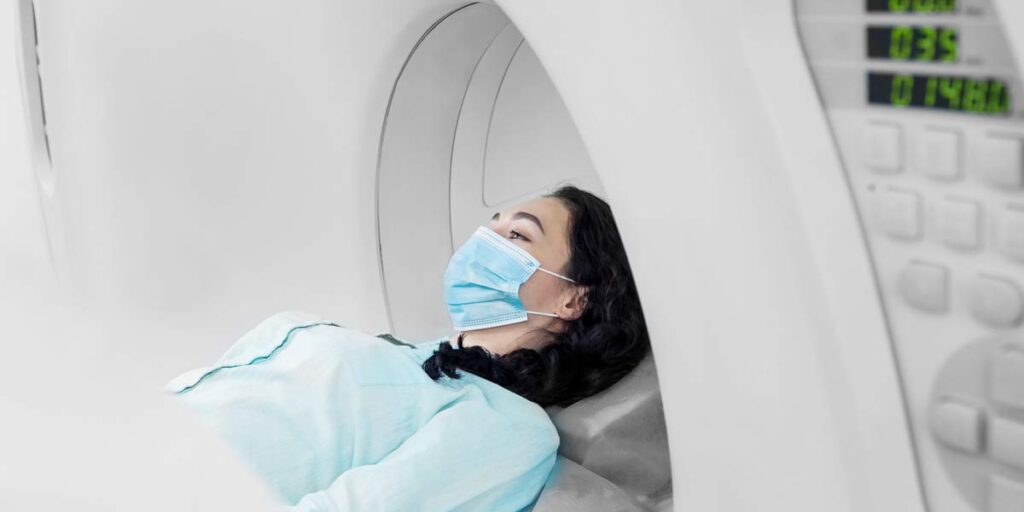Accelerated Breast MRI for Breast Implants
The U.S. Food and Drug Administration (FDA) recommends regular screening for all women with silicone gel breast implants, whether those implants were for breast augmentation or reconstructive surgery. Breast implants are resilient and strong against potential breaches, but maintenance may be required during your lifetime to evaluate their condition over time.
A routine MRI scan for breast implants can help your healthcare team detect any ruptures that may allow silicone gel to leak from the implant and migrate into the tissues. American Health Imaging (AHI) offers Accelerated Breast MRI™ as a safe, painless option for monitoring breast implants.
Getting an MRI for Breast Implants
Ruptures don’t necessarily change the look or feel of your implant, so your physician cannot always detect ruptured breast implants with a physical exam. An MRI is the most effective way to screen for a breach.
One study published in Plastic and Reconstructive Surgery from the American Society of Plastic Surgeons showed breast MRI had higher accuracy for diagnosing ruptured silicone implants after breast reconstruction when compared to ultrasound. Researchers found an MRI was 94% accurate in detecting ruptures and had a lower false-negative rate.
Screening Recommendations for Ruptured Breast Implants
The FDA recommends screening for breast implant ruptures starting five to six years after the implant is placed and then repeated every two to three years. This guidance is for people with no symptoms. If you have visible symptoms of a rupture, including breast changes, firmness, pain and swelling, speak with your plastic surgeon. Ruptures can also cause capsular contracture, which is the tightening of the scar tissue capsule around an implant. If symptoms develop, you’ll need to have an MRI sooner.
Breast MRI vs. Accelerated Breast MRI
Breast MRI provides accurate breast imaging to screen for breast cancer, follow cancer treatment or evaluate breast implants. It uses a powerful magnetic field and dedicated breast coils to provide detailed images. Accelerated breast MRI also uses radio waves and magnets to take photos of inside the breast.
So, what is the main difference between the two? Speed. Accelerated breast MRI takes only 12–18 minutes for an exam, while regular breast MRI takes 45–60 minutes. Accelerated breast MRI is also less expensive.
What to Expect During Your Exam
Here is what to expect at your breast MRI exam:
- Change in privacy. A technologist will provide a comfortable hospital gown. You may wear your own clothing if it is loose-fitting and has no metal fasteners.
- Remove metal objects. You’ll take off any metal jewelry or other objects that interfere with the machine’s magnet.
- Get positioned for the scan. Your technologist will help you onto a cushioned table with your breasts in a cushioned opening. The table will slide into the MRI machine. Some breast MRI exams use gadolinium contrast to enhance visibility. Ask your technologist if you need contrast and let her know about any allergies you have to imaging contrast or dye.
- Lie still. You’ll lie still in the machine during the test. Depending on the type of breast MRI, your test will take between 12–60 minutes. You’ll be able to speak to the technologist the entire time using a two-way intercom.
- Receive your results. A fellowship-trained, subspecialty radiologist will read the images and provide the report to your physician.*
Affordable Breast MRI
Health insurance doesn’t often cover imaging tests for breast implant ruptures. While your plastic surgeon may be able to work with your insurance company to get coverage, you may be responsible for some costs, including your deductible.
You don’t have to visit a hospital for your imaging services. AHI, a standalone clinic, offers the same imaging screenings and advanced diagnostic technology you would find at a hospital—but our imaging services typically cost significantly less. An accelerated breast MRI at AHI is only $450 (with or without physician referral).
AHI offers accelerated breast MRI in Decatur, Lawrenceville and Sandy Springs. Request an appointment today.
